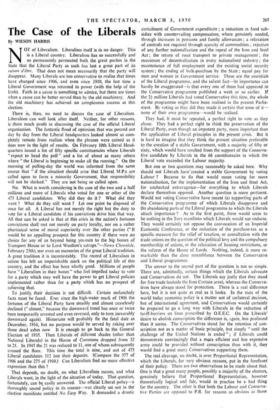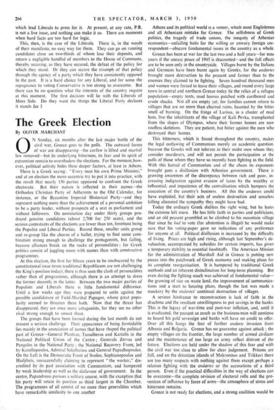The Case of the Liberals
B y WILSON HARRIS
NOT of Liberalism. Liberalism itself is in no danger. This is a Liberal country. Liberalism has so successfully and so permanently permeated both the great parties in the State that the Liberal Party as such has lost a great part of its raison d'être. That does not mean necessarily that the party will disappear. Many Liberals are too conservative to realise that times have changed since 1906, and even since 1910, the last time a Liberal Government was returned to power (with the help of the Irish). Faith in a cause is something to admire, but there are times when a cause can be better served than by the old machinery. And the old machinery has achieved no conspicuous success at this election.
There is, then, no need to discuss the case of Liberalism. - Liberalism can well look after itself. Neither, for other reasons, is there much profit in discussing the case of the official Liberal organisation. The fantastic flood of optimism that was poured out day by day from the Liberal headquarters looked almost as com- pletely remote from realism when the phrases were coined as it does now in the light of results. On February 10th Liberal Head- quarters issued a list of fifty specific constituencies where Liberals "expect to head the poll" and a list of about as many others where "the Liberal is beginning to make all the running." On the morning of polling-day the world was informed from the same source that "if the situation should arise" that Liberal M.P.s are called upon to form a minority Government, that responsibility will not be shirked." They are not being so called upon.
No. What is worth considering is the case of the two and a half millions and more of Liberals who voted for one or other of the 475 Liberal candidates. Why did they do it ? What did they want ? What do they still want ? Let one point be disposed of once for all. A Liberal has not merely the right but the duty to vote for a Liberal candidate if his convictions drive him that way. All that can be asked is that at this crisis in the nation's fortunes convictions shall rest not merely on party loyalty, nor on a rather pharisaical sense of moral superiority over the other parties C' It would be an appalling prospect for this country if there were no choice for any of us beyond being yes-men to the big bosses of Transport House or to Lord Woolton's satraps."—News Chronicle,
• February 25th), nor even on memories of the great Liberal tradition. A great tradition it is incontestably. The record of Liberalism in action has left an imperishable mark on the political life of this country, and the effect has been wholly good. Millions of people have "Liberalism in their bones" who feel impelled today to vote for a party which may well have the power to get Liberal policies implemented rather than for a party which has no prospect of achieving that.
To justify, their decision is not difficult Certain melancholy facts must be faced. Ever since the high-water mark of 1906 the fortunes of the Liberal Party have steadily .and almost ceaselessly declined (" almost," because the downward trend has once or twice been temporarily arrested and even reversed, only to turn inexorably downward again). Historians will probably fix the fatal date as December, 1916, but no purpose would be served by raking over those dead ashes now It is enough to go back to the General Election of 1935. Then Liberals of different shades (other than National Liberals) in the House of Commons dropped from 32 to 21. In 1945 the 21 was reduced to 11, one of whom subsequently crossed the floor. This time the total is nine, and out of 475 Liberal candidates 312 lost their deposits. '(Compare the 377 of 1906 and the 275 of 1910.) Can Liberalism find no more effective expression than this ?
That depends, no doubt, on what Liberalism means, and what Liberals want, in the light of the situation of today. That question, fortunately, can bc easily answered. The official Liberal policy—a thoroughly sound policy in its essence—was clearly set out in the election manifesto entitled No Easy Way. It demanded a drastic
curtailment of Government expenditure ; a reduction in food sub- sidies with countervailing compensation, where genuinely needed, through increases in pensions and family allowances ; a relaxation of controls not required through scarcity of commodities ; rejection of any further nationalisation and the repeal of the Iron and Steel Act ; the return of road transport to private management ; the
maximum of decentralisation in every. nationalised industry ; the maintenance of full employment and the existing social security
system ; the ending of bulk-purchase by the State ; equal pay for men and women in Government Service. These are the essentials of the Liberal programme, and the salient fact—its importance can hardly be exaggerated—is that every one of them had appeared in the Conservative programme published a week or so earlier. If the 21 million Liberals had voted Conservative this time, the whole of the programme might have been realised in the present Parlia- ment. By voting as they did they made it certain that none of it— none of their own programme—would be realised.
They had, it must be repeated, a perfect right to vote as they chose. They had a perfect right to think the preservation of the Liberal Party, even though an impotent party, more important than the application of Liberal principles in the present crisis. But it is hard to imagine that they think the present situation preferable to the creation of a stable Government, with a majority of fifty or sixty, which would have resulted from the support of the Conserva- tive candidate by Liberals in the 66 constituencies in which the Liberal vote exceeded the Labour majority.
But one or two questions may reasonably be asked here. Why should not Liberals have' created a stable Government by voting Labour ? Because to do that would mean voting for more nationalisation, for the implementation of the Iron and Steel Act, for unchecked extravagance—for everything to which Liberals declare themselves opposed. Another question is more pertinent. Would not voting Conservative have meant (a) supporting parts of the Conservative programme of which Liberals disapprove and (b) abandoning parts of the Liberal programme to which the Liberals attach importance ? As to the first point, there would seem to be nothing in the Tory manifesto which Liberals would not endorse. They would certainly not oppose the convocation of an Imperial Economic Conference, or the reduction of the purchase-tax as a specific measure for the relief of taxation, or consultation with the trade unions on the question of the political levy and the compulsory membership of unions, or the relaxation of housing restrictions, or the reform of the House of Lords. Nothing, indeed, is more re- markable than the close resemblance between the Conservative and Liberal programmes.
The answer to the second part of the question is not so simple. There are, admittedly, certain things which the Liberals advocate and Conservatives do not The Liberals say justly that they stand for free trade (outside the Iron Curtain area), whereas the Conserva- tives have always stood for protection. There is a real difference here, but it is not quite as real. as it looks. In the state of the world today economic policy is a matter not of unilateral decision, but of international agreement, and Conservatives would certainly be prepared to go a long way with Liberals in the reduction of tariff-barriers on lines prescribed by 0.E.E.C. On the Liberals' desire to abolish conscription the difference is, again, less profound than it seems. The Conservatives stand for the retention of con- scription not as a matter of basic principle, but simply "until the challenge of the United Nations is ended" ; if Liberals could demonstrate convincingly that a more efficient and less expensive army could be provided without conscription than with it, they would find a great many Conservatives supporting them.
The real cleavage, no doubt, is over Proportional Representation, which the Liberals, for very obvious reasons, put in the forefront of their policy. There are two observations to be made about that One is that a great many people, possibly a majority of the electors, genuinely believe that Proportional Representation, however theoretically logical and fair, would in practice be a bad thing for the country. The other is that both the Labour and Conserva- tive Parties are opposed to P.R. for reasons as obvious as those which lead Liberals to press for it. At present, at any rate, P.R. is not a live issue, and nothing can make it so. There are moments when hard facts are too hard for logic.
This, then, is the case of the Liberals. There is, in the words of their manifesto, no easy way for them. They can go on running candidates close on two-thirds of whom lose their deposits, and return a negligible handful of members to the House of Commons, thereby securing, as they have secured, the defeat of the policy for which they stand. Or they can secure the triumph of that policy through the agency of a party which they have consistently opposed in the past. It is a hard choice for any Liberal, and for some the repugnance to voting Conservative is too strong to overcome. But there can be no question what the interests of the country require at this moment. The first decision will lie with the Liberals of Moss Side. Do they want the things the Liberal Party declares it stands for 7



































 Previous page
Previous page